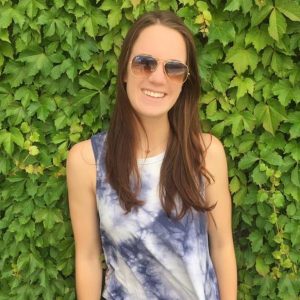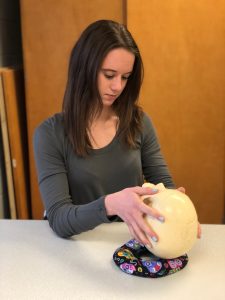Megan Patton
- Expert Role: Rookie
- Major: Human Biology
- Class: Graduate Student
- Hometown: Novi, MI
- (May 2019 Team)
Why is this humanitarian work important to you?
I have been interested in humanitarian work for many years because I believe all people have basic human rights that should be respected. Furthermore, I cannot imagine how horrible it feels to never have the closure of knowing what became of a missing family member. I am excited to be a member of the Beyond Borders team because I get to contribute to the rehumanization and redignification of those individuals who fell victim to hardships along the migrant corridor.
What do you hope to gain from this experience?
Having grown up in the Midwest, I have encountered many individuals who disregard the humanitarian crisis on the US-Mexico border because they believe they are removed from the issue. While in Texas, I hope to gain perspective on the issue and relay that back to friends and family in a context I know they will understand. Hopefully, I can help create awareness for the crisis at the southern border.
What are some of the biggest challenges you will face while in Texas?
I expect to be faced with many emotional hardships in Texas. However, I believe I am up for the challenge and I look forward to hearing the stories of individuals from south Texas communities.
What’s one thing people probably don’t know about you until they’ve known you a long time?
I love candy and always carry some with me.

When did you know you wanted to pursue human biology as a degree, and how did you become interested in forensics?
I initially became interested in forensics after taking a human osteology course in undergrad. Then, while conducting research for my undergraduate honors thesis on post-transition violence in Guatemala, I learned about the work Fundación De Antropología Forense De Guatemala (FAFG) was doing, which sparked my interest and motivated me to pursue forensic anthropology. UIndy’s unique program has allowed me to advance my forensic skills and gain a strong foundational understanding of the human body.
What advice would you give other students interested in pursuing a human biology degree at UIndy?
My advice to potential students is to be prepared to dive in and embrace the opportunities that are offered to you. The professors and other graduate students at UIndy have a wide range of expertise and can serve as a great point of reference in helping you pursue your interests.
What makes UIndy’s human biology program distinctive?
Students get to take a variety of biology courses including gross anatomy, histology, and human genetics. In addition, we get to apply what we learn in the classroom to casework/fieldwork. Overall, UIndy’s program instills in its students a holistic understanding of the human body and the opportunity to gain practical experience, which will be invaluable in the workforce and at the Ph.D. level.
